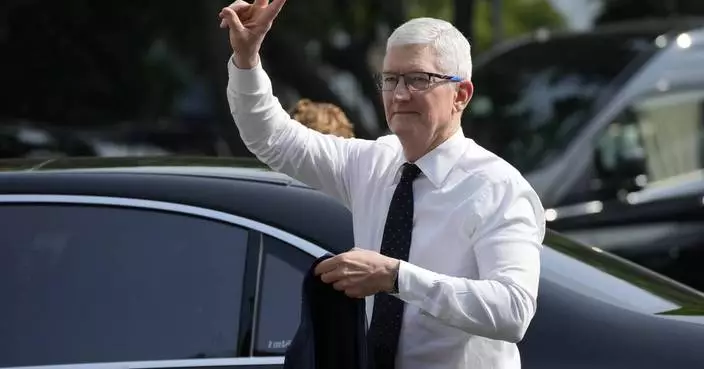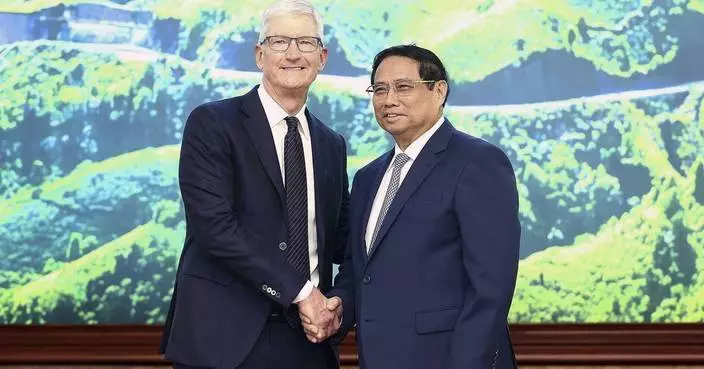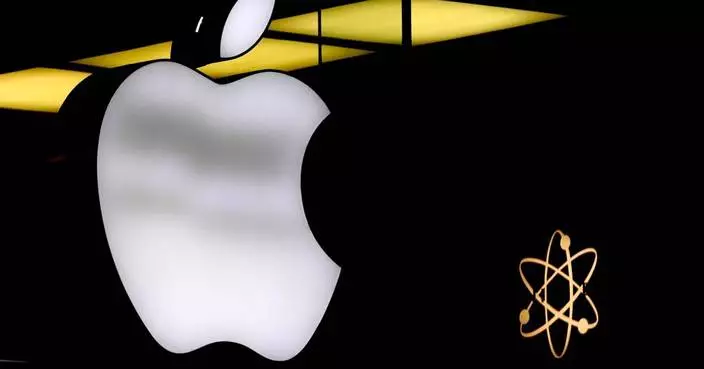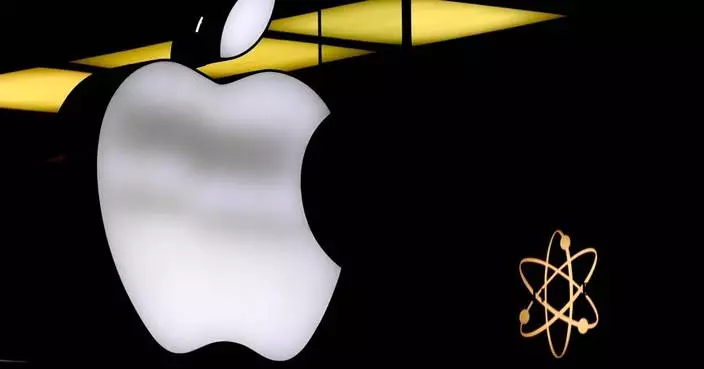A decade ago, Apple opened a store peddling iPhone apps, unlocking the creativity of software developers and letting users truly make their mobile devices their own.
The resulting explosion of phone apps — there are now more than 2 million for the iPhone alone — has changed daily life for billions of people around the world.
It has unleashed new ways for us to work and play — and to become so distracted that we sometimes forget to look up from our screens. It has created new industries — think ride-hailing services like Uber, which would be unimaginable without mobile apps — and pumped up demand for software developers and coding schools.
But it has also opened the door to an age of technology anxiety, rife with concerns that apps are serving us a little too well and holding our attention whether we want them to or not.
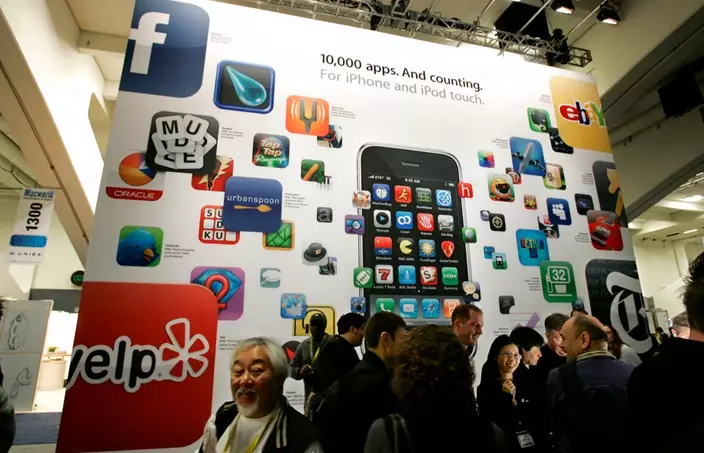
FILE - In this Jan. 6, 2009 file photo, a poster touting applications available for Apple's iPhone and iPod touch is seen at the Macworld Conference and Expo in San Francisco. Since its debut 10 years ago Tuesday, July 10, 2018, Apple’s app store has unleashed new ways for us to work, play, and become lost in our screens. (AP Photo/Paul Sakuma, File)
IN THE BEGINNING
None of that was going on when Apple's app store debuted 10 years ago Tuesday. At the time, mobile phones were largely a take-it-or-leave it proposition, with features programmed by their manufacturers and customization mostly limited to a choice between tinny electronic ringtones.
The iPhone itself was still in its infancy, with only 6 million devices sold during the device's first year. Then came the App Store, which offered 500 programs users could take or leave themselves. During its first weekend, people downloaded 10 million apps — many of them games.
Apple competitors Google, Amazon and Microsoft soon launched their own app stores. Together, these companies now offer roughly 7 million apps . Apple, meanwhile, has now sold more than a billion iPhones .
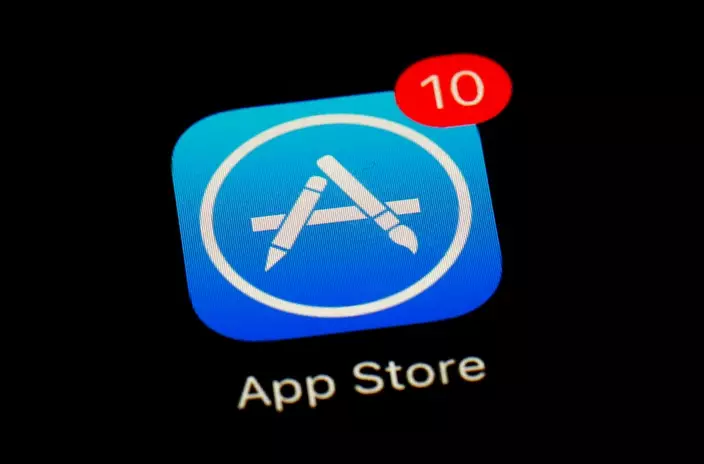
FILE - This March 19, 2018 file photo shows Apple's App Store app in Baltimore. Since its debut 10 years ago Tuesday, July 10, 2018, Apple’s app store has unleashed new ways for us to work, play, and become lost in our screens. (AP Photo/Patrick Semansky, File)
THE APP ECONOMY
That app tsunami, and the riches it generated, spawned new economic opportunities. Billions of dollars flowed into startups dependent on their apps, from Uber to Snapchat to Spotify to game makers like Angry Birds creator Rovio. Opportunities for software developers blossomed as well.
Apple perhaps benefited most of all. Its "free" apps usually display advertising or make money from subscriptions or other in-app purchases, while others charge users to download. Apple takes a cut of this action, sometimes as much as 30 percent.
The app store is now the fastest growing part of Apple's business. Together with other Apple services, the app store generated $33 billion in revenue over the year that ended in March. The company says it has paid out more than $100 billion to developers during the past decade.
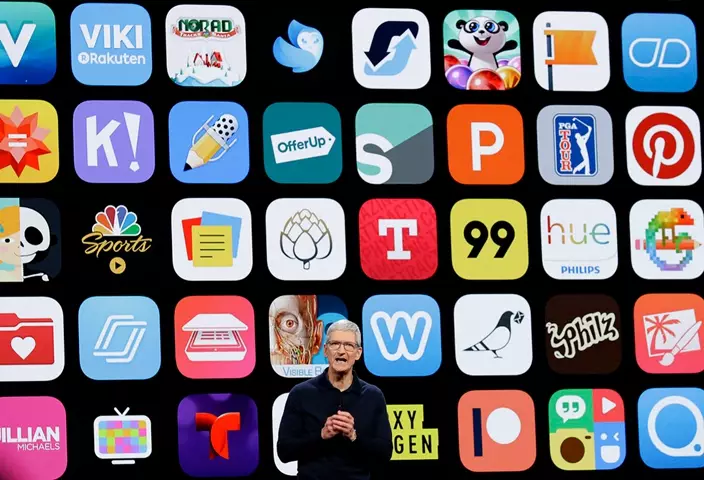
FILE - In this Monday, June 4, 2018 file photo, Apple CEO Tim Cook speaks during an announcement of new products at the Apple Worldwide Developers Conference in San Jose, Calif. Since its debut 10 years ago Tuesday, July 10, 2018, Apple’s app store has unleashed new ways for us to work, play, and become lost in our screens. (AP Photo/Marcio Jose Sanchez, File)
THE OTHER SIDE OF APPS
For all the possibilities apps have allowed, there's also a dark side.
The Center for Humane Technology, an advocacy group formed by early employees of Google and Facebook, charges that many apps are engineered specifically to capture our attention, often to our detriment. That makes them "part of a system designed to addict us ," the group says.
Apple says it shares similar concerns. To help, the company is adding new tools to the iPhone to track and control the usage of the most time-consuming apps.
CAPE TOWN, South Africa (AP) — Congo ’s government is questioning Apple about the tech company’s knowledge of “blood minerals” from a conflict zone in the African country that could be smuggled into its supply chains and is demanding answers within three weeks.
A group of international lawyers representing Congo said Thursday that they sent letters to Apple’s CEO Tim Cook and its French subsidiary this week, raising concerns about human rights violations involving the minerals extracted from mines in the country’s troubled east that might end up being used in the company’s products.
They included a list of questions challenging Apple to show how it monitors its supply chains in a region where more than 100 armed rebel groups operate, some of whom have been accused of carrying out mass killings of civilians.
Writing to Cook, the lawyers said “it has become clear to us that year after year, Apple has sold technology made with minerals sourced from a region whose population is being devastated by grave violations of human rights.”
"The iPhones, Mac computers and accessories that Apple sells to its customers around the world rely on supply chains that are too opaque, and that are tainted by the blood of the Congolese people," the lawyers said.
Eastern Congo is one of the most mineral-rich regions in the world but is also the site of a huge humanitarian disaster, with the armed groups fighting for years for control of the mines and the valuable minerals in them, and millions of people displaced and affected by the worsening violence. The situation has deteriorated badly in the last few months.
Apple’s press representatives in Europe didn’t respond to a request for comment.
Apple, which has a market value of around $2.6 trillion, has denied using minerals from mines and regions where human rights violations take place and says it conducts business ethically. It said in a 2023 report that it “responsibly” sources minerals in Congo and its neighboring countries.
The minerals it buys don't finance war or armed groups, it says. The lawyers for the Congo government said “those claims do not appear to be based on concrete, verifiable evidence.”
The Congo government said it has suspicions that some of the tin, tungsten, tantalum and gold — known as the 3TG critical minerals — that Apple sources from suppliers is smuggled out of Congo to neighboring Rwanda and then infiltrated into the global supply chain. The 3TG minerals are key components in electronics.
“In Congo, people have been dying for 30 years as a result of illegal mining,” Congo government spokesperson Patrick Muyaya said. “We want clarification on the sources of supply for major technology companies, in particular Apple, to verify whether they are acquiring minerals produced in completely illegal conditions.”
He said Rwanda “is presented” as the supplier for many of the minerals while having few reserves of its own.
Congo has accused Rwanda of financing and directing the notorious armed rebel group M23 in eastern Congo to help extract minerals illegally. The United Nations also says M23 is backed by Rwanda.
Rwanda denies that but tensions between the countries are increasingly high, while M23 and other groups are accused of regularly carrying out attacks that include the killing and raping of civilians, according to Human Rights Watch.
The lawyers for the Congo government quoted a 2022 report by the nongovernmental organization Global Witness that claimed Apple had previously applied “few meaningful mitigation measures” to avoid using smuggled minerals.
The Congo government was now seeking “effective redress” against “end-users of blood minerals” across the world, the lawyers said.
They asked Apple to respond to questions over its supply chain controls within three weeks and said they had compiled a report on “the laundering” of Congo's minerals by Rwanda and private entities that would be made public this month.
They also would seek instructions from the Congo government as to what legal measures it is considering against Apple, the letter said.
AP Business Writer Kelvin Chan in London and AP writer Saleh Mwanamilongo in Kinshasa, Congo, contributed to this report.
AP Africa news: https://apnews.com/hub/africa
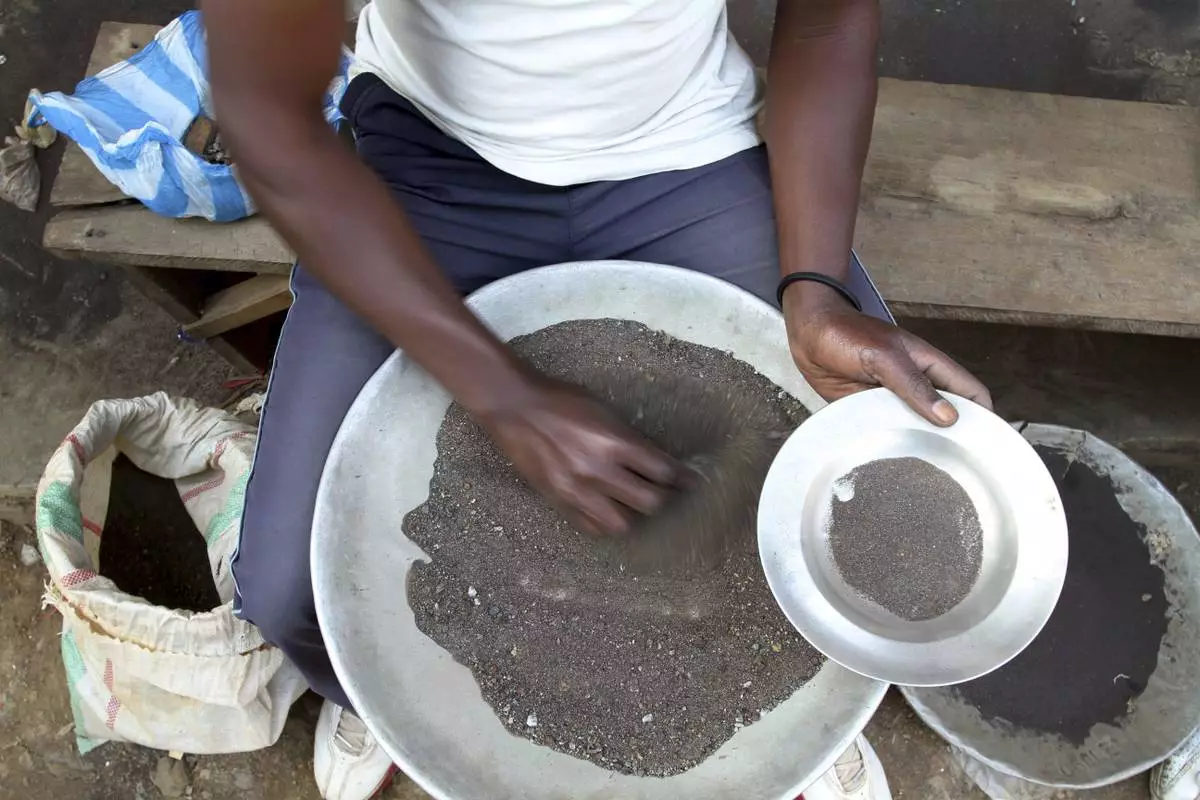
FILE - A Congolese miner sifts through ground rocks to separate out the cassiterite, the main ore that's processed into tin, in the town of Nyabibwe, eastern Congo, Aug. 16, 2012. Congo’s government is questioning Apple about the tech company’s knowledge of “blood minerals” from a conflict zone in the African country that could be smuggled into supply chains. A group of international lawyers representing Congo said Thursday, April 25, 2024, that it sent letters to Apple’s CEO Tim Cook and its French subsidiary this week raising concerns about human rights violations involving the minerals extracted from mines in the country’s war-torn east. (AP Photo/Marc Hofer, File)







